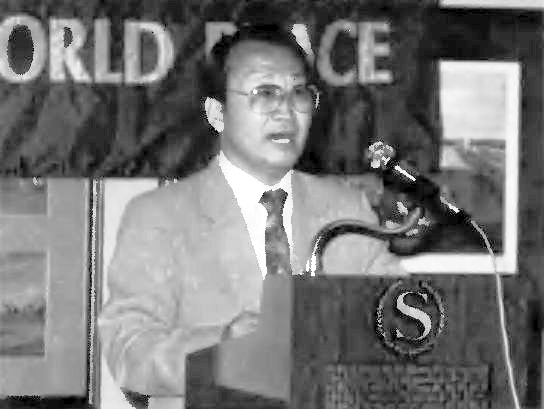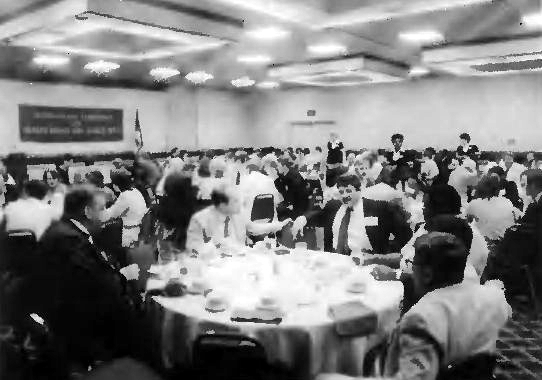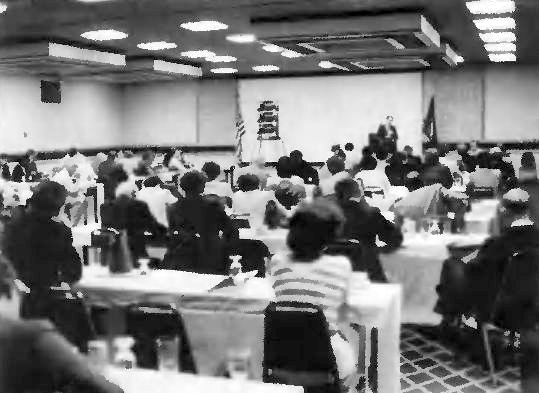![]()
The Words The Kwak Family
|
|
The Words The Kwak Family |

This is the speech Rev. Kwak gave at the International Conference on Human Rights and World Peace. It is a condensation of a paper that was distributed to all participants.
Ladies and gentlemen: I am deeply honored to add my welcome to you, not only on behalf of the International Cultural Foundation, but also on behalf of the Reverend Sun Myung Moon, who conceived the idea of the International Conference on Human Rights and World Peace.
This evening I would like to present a brief overview of the Unification perspective on human rights and world peace, including the relationship between the two and our responsibility for their realization.
Many human rights have been postulated -- both spiritual rights and material rights. On the personal side, all human rights are essentially questions of dignity and self-fulfillment. On the social side, the prerequisites for human rights -- for human dignity and fulfillment -- are freedom and opportunity.
Spiritual rights include freedom of religion and belief, freedom of artistic and intellectual expression, and freedom to participate in social policy. Among the most obvious physical rights are economic opportunity and material sufficiency. People should be free to practice their faith and conduct their private lives while living comfortably in peace with their neighbors and the larger society.
The Unification worldview, centering on faith in an unconditionally loving parental God, offers a theological basis for the dignity and rights of all individuals wherever they may be, and affords insights into what is involved in dignity and fulfillment. First, a theological basis for human dignity and rights is found in the idea of our individual value to God, our heavenly Parent. To speak of God as our heavenly Parent is to affirm that each of us is one of God's children, uniquely manifesting God's nature, and irreplaceably valuable to God. In addition to being uniquely valuable to God, we say that every human being is created by God with cosmic value. Unlike animals, each human has the potential to comprehend and embrace the whole creation, and humans are the only creatures who live in both the spiritual and material dimensions of the cosmos, mediating and harmonizing both. Each human being has immeasurable value to God, value beyond that of the entire cosmos.
The Unification worldview teaches that every human being, in addition to having unique and cosmic value, is created to attain divine value. God gives all-transcending love to each and every entity in the creation, loving and serving both people of goodness and people filled with evil. God's love, given in every moment, aims beyond the moment, toward the fulfillment of every being. Human beings have the potential to attain unconditional, all- transcending, universal love; to love as God loves. This is the teaching of Jesus in Matthew 5:44-48. We must never tolerate oppression of any person, hindering their growth in love, or their contribution of love.
The conclusion drawn from regarding each individual as valuable to God is that we are to love each person with God's heart, understanding him or her to be God's son or daughter, the substantial image of the incorporeal God. The dignity and rights of all people, from infancy through old age, should be absolutely guaranteed so that they may pursue their full value through fulfillment of their responsibility to God.

Lawyers
engage in informal discussion during a meal.
The Unification worldview also asserts a theological basis for equal dignity and full opportunity. It insists, almost as its first assertion, that men and women are equally the image of God, that in God we find the virtual source of all masculinity and the virtual source of all femininity as well. The Unification worldview also points out that God is the creator of both spiritual reality and material reality. Each reflects an aspect of God's nature. God is the source and promoter of both spiritual value and physical value, and seeks abundant life for all humans, both spiritually and physically
From this perspective, let us further consider spiritual and material rights. Spiritual rights must never be limited to internal freedom but must include external opportunity -- the opportunity of expression and practice. This accords with our understanding that God not only feels, thinks, envisions, and wills, but also acts, creates, and gives. There must be full freedom to practice religion in community, full political freedom to form political associations, and full freedom of artistic expression. Curtailment of political freedom usually impinges upon religious and creative freedom. No one can guarantee an audience for the preacher, the politician, or the poet, but we can guarantee their access to potential audiences, as well as the freedom and opportunity to create and proclaim.
I will now refer to a very special feature of human life and a crucial human right. Most people seek a continuing and rewarding family life, free from interference. In the Unification view, personal fulfillment ultimately involves the deepest intimacy of family life and the opportunity to give eternal, transcendent love through family relationships. The opportunity to form and maintain rewarding family relationships should definitely be assured. Of course, there are those who either are not ready to form families or choose to sacrifice family life for other values. Their right to so live, as long as they wish, must also be protected.
The right to a home forms a link between spiritual rights and material rights. Family life includes both the spiritual life of love, of truth, of beauty and goodness, and the life of the physical body. Unification theology teaches that God created the earth, even the whole cosmos, to be a common home for all people. Family life flourishes naturally in a home, which is a framework for intimacy and cooperation, for mutual responsibility and shared creative activity.
The Unification worldview teaches that God has given humans cocreatorship, in order that we may be God's partners as God's agents. God has implanted in us the character to have a loving dominion toward all things of nature, as well as the talent for participating in their arrangement for the greatest benefit of all. From this we can understand that material rights are more than the rights of economic opportunity and sufficiency. They include the right to pursue creative activity according to one's talents and desire, and the right to live in a wholesome and beautiful environment, the opportunity to experience the countless delights afforded by nature. Clearly, intergovernmental cooperation is needed to facilitate these rights, on the foundation of a higher value standard among the citizenry.
Certain ideologies assert that material rights, notably economic sufficiency, are the basis for spiritual rights. They note the importance of leisure time for spiritual practice. However, deeper reflection reveals that material rights themselves can result only from the spiritual decisions of human beings. Economic development, for instance, depends not only on creativity, but on decisions concerning cooperation. These decisions in turn require mutual trust and faith -- a faith which is best derived from faith in the Creator. Economic distribution is, in turn, determined by ethical decisions.
The great advances in human culture arise not from material change but from spiritual insight and practice. To attain all rights, and to develop a culture of rights and peace, spiritual freedom is the most essential.
Then what is the state of human rights today, and what are the prospects for human rights?
The prospects are, I believe, excellent. I firmly believe that God has intervened decisively in history and is establishing His heavenly kingdom on earth, which is essentially the free and full exchange of true love throughout the world. The social environment for this kingdom must be one of true cooperation in full freedom. Everyone will want to participate in the universal society of love, offering his or her unique contribution, not out of duty but from love. All social relationships will be as loving as family relationships naturally are. People will also appreciate and care for nature. In such a society people realize God's three blessings to human beings -- the blessing of completed personhood, the blessing of loving relationships, and the blessing of loving dominion toward the creation.
God's preparations for the heavenly kingdom have been accelerated in modern times. Throughout the world the increase in spiritual sensitivity, calls for mutual respect and love and for the equality of people, and movements for freedom and liberation reveal God's providence for the recovery of original love and freedom so that people may realize their original value and attain completed personhood. Socially we find new intercultural exchanges and sensitivity, new generosity of nations toward other nations, and the formation of numerous international institutions. These reveal God's social preparation for the world of universally loving relationships. Further, the expansion and spreading of people's love and gratitude toward the things of nature is evident in a new ecological consciousness buttressed with scientific advances. Owing to spiritual development and scientific technology, humanity now has the capacity to develop a high standard of living, showing God's preparation for the time when we will live in loving dominion toward all things. There lacks only the will and understanding for peaceful cooperation among peoples.
These signs affirming hope notwithstanding, we all know that many people and nations are not yet committed to full respect for all human rights. This is true despite the existence of noble- sounding constitutions throughout the world. The Soviet constitution, for instance, claims to protect the right to practice any religion. But we know that in reality there is severe curtailment of religious expression, and that economic sanctions are routinely used against churchgoers. In America, where commitment to religious freedom appears strong, we are challenged as to whether there is full and non-discriminatory economic opportunity and material sufficiency.
I would now like to consider the causes of the limitation of rights in the context of the relationship between human rights and peace.

A
question-and-answer session follows a lecture.
The internal causes of the continuing weakness in guaranteeing human rights are narrowness of love and inadequate value standards. But there are also external pressures against human rights, especially intergroup and international conflicts. Wars, international rivalry and hostility, and abnormal fear of war are often advanced as the rationale for much disregard or violation of personal rights. To promote world peace is also to work for human rights.
The reverse relationship between human rights and peace also holds: people who truly respect individual rights would never initiate military aggression. Even in the case of a possible "just war," deprivation of life per se is a violation of human rights. Therefore, to promote the development of love and higher value standards which increase commitment to personal rights is also to work for peace.
Even as the possibilities for world harmony and love exist, world conflict has risen to a terrible, seemingly apocalyptic level. International conflict has been escalating relentlessly throughout this century. Faced with the dual prospects of the end of war or the end of hope, we must urgently seek new strategies for peaceful relationships among nations and groups of nations.
Populaces often succumb to narrow passions, and governments may place material values above spiritual values or act or respond out of great fear. But it is the original nature of religions to be transcendent of nationalism. If the great religious leaders are true to the purpose of religion, and act in harmony, they will work individually and corporately to discover the heart of God and the spiritual laws of forgiveness, reconciliation, and harmony. Together they should convey these to all people, and in this way play a new and crucial role in the solution of conflict and the building of peace.
People are individually beset by conflicts within themselves, and it is these conflicts which have been manifested in society, forming the whole history of struggle. True and lasting world peace will come only when we find the individual of perfect inner peace and true love and the family that exemplifies genuine, world-embracing peace and love. It is in the family that relationships of peace or hostility and values of breadth or narrowness first are learned and developed. The child who becomes alienated from his parents becomes the citizen who cannot promote national trust and unity. The child who hates or fears his brother becomes the citizen ready to war against other peoples. We look to the time when all social relations will be cooperative family-like relations, when the whole world is a harmonious family of nations and all people will be as one peaceful family.
Since the cause of individual inner conflict lies in estrangement from God and in spiritual ignorance, it is through religion that God will bring about the individual of peace, the family of peace, the society of peace, the nation of peace, and the world of peace.
Peace never comes through violence. That is a simple and absolute law. Peace results only from sincere interactions of giving and receiving undertaken for mutual benefit. The ultimate social peace we all seek will be realized only when every individual is deeply satisfied. The peace builder therefore needs to go forth in the spirit of sacrifice and with the heart of love and service. A people deeply committed to universal peace and justice will have spiritual power to win any rival over and will never need to resort to violence. Only spiritual power suffices to wage peace. The biblical story of how Jacob reconciled with his brother Esau illustrates the point. History shows that when people are spiritually weak, they will use defensive violence to protect human rights. Yet sooner or later a price must be paid, in the process of reconciliation with a bitterly defeated enemy, as well as in purifying one's own character from having used violence.
Peace, then, comes through unconditional love and giving. This is the way of God and the way of Christ: loving and serving to build harmony and to overcome resentment. The nations to whom God has already granted great abundance should set the standard for the greatest sharing with others, for the sake of God, the sake of love, and the sake of peace.
In conclusion, I firmly believe that God, the source of unconditional love, is the source of human dignity and peace. God intended us to live in peace and love. I firmly believe that if you respect all individuals and serve them, you will be united with them and you will truly meet God.